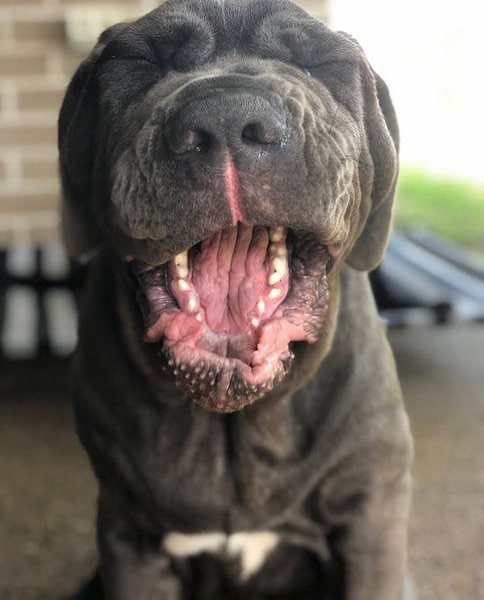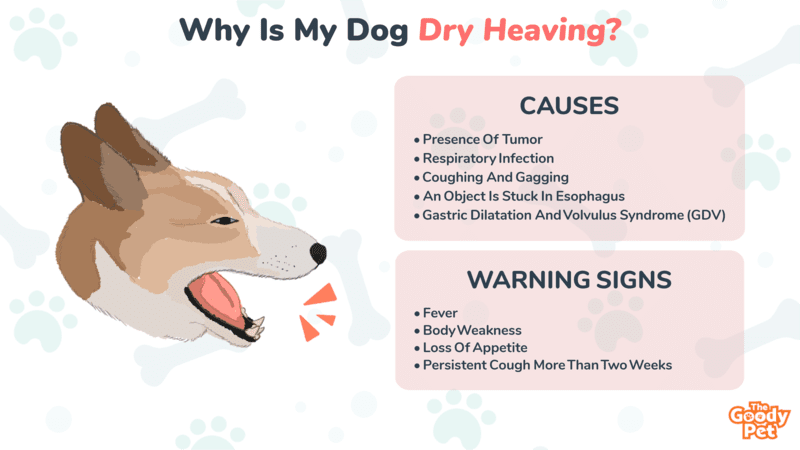Dogs throw up for several reasons, but the sight of your dog attempting to vomit without success is troubling. Dry heaving is not uncommon in dogs, and you can’t help but ask, “why is my dog dry heaving?”
Your dog dry heaves because it may have fallen ill and infected with kennel cough or attempting to get rid of foreign objects from within. Retching and gagging are evident in the discomfort your pooch is experiencing.
Do you care about knowing how to help your pooch feel better in similar scenarios or preventing it altogether? This write-up provides the information you need on the issue of dry heaving, including how to know when the situation requires medical intervention. So read on, for the love of your furry friend.
What Does It Mean If My Dog Keeps Dry Heaving?
If your dog keeps dry heaving, it may have some respiratory infection or the meaner Gastric dilatation and volvulus syndrome (GDV). You have to ascertain which of these is wrong with your dog.
Dry heaving is not always an issue to worry about. It is only a problem when it keeps happening within a short period. That means the stimulant is lingering, and a medical check-up is the best way to identify the cause.
Causes Of Coughing And Dry Heaving In Dogs
Your dog may keep coughing and dry heaving if it has an obstruction in his throat. An object may refuse to go down after swallowing, or a tumor has grown in the esophagus. Such tumors make your canine feel like there is something to push down their esophagus. The coughs are a result of irritation of the gullet, causing your puppy to cough.
Until you have dealt with the stimulant or causative disease, your dog will not find relief. See a vet as soon as you can aid your pooch in getting rid of the discomfort.

An Object Is Stuck In Your Dog’s Esophagus
It is no news that dogs tend to nibble on things that are sometimes not edible. Paper towels, sticks, and small balls, among others, can wedge into their throat. The blockage will greatly inconvenience dogs as they constantly make several attempts to clear out the blockage.
Your Dog Has A Respiratory Infection
One common respiratory infection in canines is kennel cough. Also known as infectious bronchitis in dogs, kennel cough arises from the presence of bacteria and viruses in the respiratory tract of dogs. It is also notorious for making dogs cough vigorously and heave simultaneously.
Gastric Dilatation And Volvulus Syndrome (GDV)
If your dog has been vomiting and then begins dry heaving, GDV, also known as bloating, is the likely culprit. Medical reports describe its action as distending a canine’s gut and forcing a rotation or twist around its short axis. Several complications can arise from this disease, making it potentially fatal.
Presence Of Tumor
If a tumor is found manifesting in the throat area, dogs will feel like an object is down there, causing them to constantly swallow to try pushing the object down and past the gullet. As another attempt to rid itself of this obstruction, your canine may end up coughing and heaving to clear the esophagus.
The presence of the tumor may also indicate the likelihood of cancer and its risk of metastasis if it goes untreated. Consult your vet for medical advice to know what is expected next.
What Does Dry Heaving Sound Like In A Dog?
You can tell that your dog is dry heaving if it makes a retching sound and nothing is coming out. The sound is typical of that of a vomiting dog. You can audibly discern some discomfort in the dog. You can watch this video to hear how a dry heaving dog sounds.
What To Do When A Dog Is Heaving?
If your dog is heaving, you should wait for a while to see if it subsides. If the action persists, you should take the puppy to see a vet.
Other Issues That Come With Heaving
Meanwhile, some other processes can accompany heaving. One example is the unsuccessful attempts to throw up, while another is coughing and gagging. Let’s examine what to do in these situations.
Your Dog Can’t Throw Up
If your dog can’t throw up, you may need the help of a vet immediately. Check on the frequency of its attempts to vomit. Should it worsens and not appear to subside in a few minutes, contact your family vet.
The veterinary doctor will ask you a few questions to get a prognosis. If the situation demands so, you will have to take your dog to the animal clinic.
Your Dog Is Coughing And Gagging

If your dog is coughing and gagging, take note of the sequence in which it is happening. Record a short clip and patch it through to your vet to determine what you should do.
Mostly, when a dog coughs, gagging follows. There appears to be an attempt to clear the throat after each cough. Accompanying the gagging will be a retching sound. Should you notice that your dog coughs, gags, and coughs again, bring your pooch down to the vet right away.
Besides, there is always the possibility of your dog being in worse condition than you think. Some diseases or infections can be responsible for the incessant gagging and coughs. For example, a timely diagnosis of GDV can spell the difference between the survival and demise of your four-legged furry friend.
Detecting Blockage In Your Dog
If your dog has a blockage, watch out for some symptoms as contained in the veterinary manual. These include repeated attempts to swallow, excessive drooling, gagging, and regurgitation.
Dogs are notorious for biting and tugging at different materials. If you’ve known your fiddle to do such, you may have the case of an obstructed gullet at hand.
Another way to know is to take your dog for an X-ray. That should reveal any obstruction in the esophagus. Upon discovery of an object, do not attempt removing it by yourself. Your furry friend may get hurt in the process. Allow your vet to recommend which way is best to get the obstruction out.
Detecting Gastric Torsion In Your Dog
You can tell if your dog has gastric torsion by simply identifying the signs. Notable ones among them include restlessness, inability to lie down, visible swelling in the abdomen, and signs of distress.
Meanwhile, bloating precedes torsion, and these symptoms can become evident even before twisting of the stomach occurs. An X-ray is best for confirming gastric torsion. The symptoms can come up within a short period and aggravate as well. It is crucial to treat these symptoms as an emergency.
Can Your Dog Die From Bloating?
Yes, your canine pet can die from bloating. The American Kennel Club’s Kennel Health Foundation has estimated that between 10 to 23% of dogs do not survive treatment for the GDV.
The expansion of the stomach exerts pressure on other organs in the gut. Blood vessels may not be able to carry blood around the body. Some of the symptoms such as low blood pressure, rapid heartbeats, pale gums, and sudden collapse resulting from pressure on blood vessels.
Moreover, the resulting pain from this condition is excruciating. The pathetic sight of canine suffering from this condition will linger for long in the memory of an owner.
When Should I Be Concerned About My Dog’s Cough?
If your dog coughs occasionally, there isn’t a need to worry. But if you notice that the cough is a lot more frequent, it is a strong indication that your dog is ill and in need of a vet visit.
Dogs cough for various reasons. A persistent cough will require medical attention, or else the condition may worsen. Bronchitis or kennel cough, on the other hand, requires immediate medical assistance.
There are several ways to determine if your dog has indeed been infected with these respiratory diseases.
- Try to recall if your dog has been around other canines earlier, perhaps in a shelter home, boarding house, or a public place with a large gathering of furry canines. Kennel cough is airborne and highly contagious. Dogs can get it from using troughs and toys of an infected dog or being near one.
- A strong, honking dry cough is the most conspicuous symptom of kennel cough. Others include fever, loss of appetite, running nose coupled with frequent sneezes, and fatigue.

Treatment For Kennel Cough
Adequate rest, dieting, and ensuring hydration are sufficient to get your dog back in shape in two weeks at most. Dryness of the air can aggravate the condition.
Investing in air humidifiers should help create a soothing effect in the lungs of your dog. You can also administer cough suppressants and antibiotics to help your dog recover quickly.
However, if your dog’s seemingly mild cough persists for more than two weeks and shows no indication of subsiding, you must visit the vet. If that’s the case with your dog, you should immediately take him to the hospital.
Also, loss of appetite, body weakness, and fever are signs that home treatment will not be sufficient. There is a chance that other conditions like pneumonia are present, and only a test will reveal them.
Prevention Of Kennel Cough
You can prevent your pet from contracting kennel cough. There are vaccines for some of the prominent causative bacteria and viruses.
You should take your puppy to a pet vaccination center and get the Bordetella bronchiseptica vaccine. The bacterium is the most notorious among associated causative organisms of kennel cough. However, the vaccine isn’t going to last for a lifetime and your pooch needs to get the vaccine at least once in a year.





